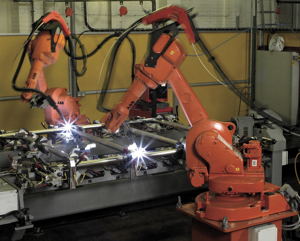£600,000 programme aims to boost automation uptake
The Government is providing £600,000 of funding for a programme aimed at encouraging the uptake of automation technologies in the UK. The two-year programme – to be run by the British Automation and Robot Association (Bara) – will identify potential opportunities for increased automation, and provide impartial expert assistance to companies wanting to introduce higher levels of automation.

Although UK companies bought 65% more robots last year than they did during 2009, the country still lags far behind its industrial rivals in adopting this technology. For example, while the UK has just 25 industrial robots per 10,000 employees in non-automotive manufacturing, the corresponding figure for Germany is 127. Sweden has 114 robots per 10,000 employees, and Italy has 97. And while Germany has an installed base of 144,800 robots and Spain has 28,600, the UK has just 15,100.
“Although the UK is a long way behind in the use of automation when compared to some other countries, manufacturing in the UK has many strengths, including reasonable productivity levels achieved by the widespread assimilation of lean concepts,” says Bara president, Mike Wilson. “If the use of automation can be increased, UK manufacturing has the potential to be a significant force in global markets – however, there is a definite need for an overall strategy to be co-ordinated and driven at a national level, and the Automating Manufacturing Programme looks to aid this.
“In a relatively high-cost economy such as the UK,” he adds, “the application of automation is an essential ingredient in the sustainability of manufacturing businesses, enabling them to compete more successfully in the global market. Automating manufacturing processes not only drives costs down, it improves quality, reduces waste and optimises energy use.”
Wilson believes that the new programme will provide manufacturers with the expertise to help them overcome the obstacles that deter them from adopting automation.
Bara is also organising a series of ten roadshows at locations around the UK, starting at the end of March, which will help SMEs to understand the benefits of automation and provide advice on taking the first steps in adopting automation.
The Government funding – from the Department for Business, Innovation and Skills (BIS) – follows a study published last year which found that the main barriers to the wider use of automation in the UK were: a lack of awareness of what automation can achieve; a gap in the engineering skills needed to apply automation systems; and an aversion to risk.
The study – commissioned by the Engineering and Machinery Alliance with support from BIS and sponsored by Bara – quizzed manufacturers of engineered products and food in Spain, Germany, Sweden and the UK. It found that while obtaining funding was an obstacle for UK manufacturers, it was less a problem in the other countries. And while UK companies were typically looking for two-year paybacks on their automation investments, companies in Spain and Germany were prepared to wait up to five years for a return on their investments.

